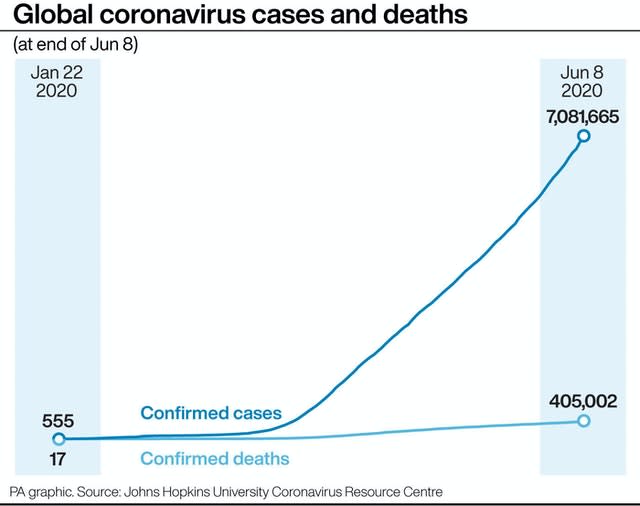Coronavirus surge warning as restrictions eased in world’s poorest regions
Experts have warned that a further surge of coronavirus in under-developed regions with shaky health systems could undermine efforts to halt the pandemic.
Scientists have called for more realistic options as many countries begin lifting lockdown measures.
Brazil, Mexico, South Africa, India and Pakistan are among the countries easing tight restrictions before their outbreaks have peaked or any detailed surveillance and testing system have been put in place to keep the virus under control.

Dr Bharat Pankhania, an infectious diseases expert at the University of Exeter, said: “Politicians may be desperate to get their economies going again, but that could be at the expense of having huge numbers of people die.”
He said reimposing recently lifted lockdown measures was equally dangerous.
“Doing that is extremely worrying because then you will build up a highly resentful and angry population, and it’s unknown how they will react,” he added.
And as nearly every developed country struggles with its own outbreak, there may be fewer resources to help those with long overstretched capacities.
Tedros Adhanom Ghebreyesus, director-general of the World Health Organisation, said the pandemic is “worsening” globally, noting that on Sunday countries reported the biggest ever one-day total: more than 136,000 cases.
With almost 7M #COVID19 cases & 400K deaths globally, this is not the time for any country to take its foot off the pedal. We urge active:-surveillance to ensure the virus does not rebound-finding, isolating, testing & caring for every case-tracing & quarantining every contact https://t.co/B7po1dAN3F
— Tedros Adhanom Ghebreyesus (@DrTedros) June 8, 2020
Among those, nearly 75% of the cases were from 10 countries in the Americas and South Asia.
Wealthy countries in Europe and North America hit first by the pandemic are training armies of contact tracers to hunt down cases, designing tracking apps and planning virus-free air travel corridors.
But in many poor regions where crowded slums and streets mean even basic measures like hand-washing and social distancing are difficult, coronavirus is exploding now that restrictions are being removed.
Last week, Brazil, Mexico, South Africa, India and Pakistan all saw one-day records of new infections or deaths as they reopened public spaces and businesses.

Clare Wenham of the London School of Economics described the situation in Brazil as “terrifying”, noting the government’s decision to stop publishing a running total of Covid-19 cases and deaths.
“We’ve seen problems with countries reporting data all over the world, but to not even report data at all is clearly a political decision,” she said.
“That could complicate efforts to understand how the virus is spreading in the region and how it’s affecting the Brazilian population,” Wenham added.
Johns Hopkins University numbers showed Brazil recorded more than 36,000 coronavirus deaths on Monday, the third-highest in the world, just ahead of Italy. There were nearly 692,000 cases, putting it second behind the US.
Rio de Janeiro allowed surfers and swimmers back in the water and small numbers of beach-goers were defying a still-active ban on gathering on the sand.

Bolivia has authorised reopening most of the country, Venezuelan President Nicolas Maduro also recently unwound restrictions, Ecuador’s airports have resumed flights and shoppers have returned to some of Colombia’s shopping centres.
In Mexico, President Andres Manuel Lopez Obrador urged the country to stay calm after officials last week reported escalating fatalities that rivalled those in Brazil or the US.
“Let there not be psychosis, let there not be fear,” Mr Lopez Obrador said, while accusing the media of fanning concerns of an escalating crisis.

 Yahoo News
Yahoo News 








